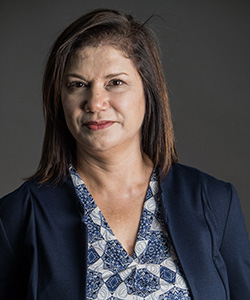
The African college of excellence in the social and human sciences
South Africa’s transition from apartheid to democracy was a time of uncertainty for the nation but a defining moment for Prof Marilyn Naidoo, as it brought in its wake endless possibilities for uniting humanity through theological education. She stands firm in a theological education vision that is engaging, critical, liberating and humanising.

Prof Marilyn Naidoo
She has spent the last 15 years surveying and documenting the field of theological education in Africa. Today Naidoo is a Research Professor in Practical Theology in the Department of Philosophy, Practical and Systematic Theology, in the College of Human Sciences.
As a practical theologian with a focus on the educative task, Naidoo’s theoretical contribution has been on formative learning and moving education beyond knowledge transmission to integrated human development.
"This type of learning can be a humanising resource that can deal with the psychological scars of apartheid, create safe space and nurture in religious leaders a stable professional identity," she says.
However, developing in students the many competencies required, would also involve interrogating issues of epistemological, social, cultural and institutional realities in the learning environment.
Given the slow transformation within higher education cultures in South Africa, Naidoo’s research highlights the lack of awareness of the way in which institutions are organised, which then holds direct consequences for students, identity and transformation.
Her broader scholarship reveals a fundamental need to be critically aware of justice and inclusion issues, and how these issues intersect with personal, professional and scholarly environments.
"There is a definite correlation between social practices and identity development," Naidoo indicates. Her research highlights the change process happening at a micro level in religious communities.
For instance, the question of how churches educate their members about social reconciliation is key, as religious discourses shape group and individual identities which results in the socialisation and scripting of theological students.
This research was published in The Conversation with an article entitled "How multicultural churches in South Africa are breaking down race barriers", with over 28 000 reads, resulting in various community engagements.
"There is a uniquely South African transformation imperative for academic theology, and theological education does have consequences for social change modelling egalitarian environments," she said.
Naidoo’s research focus on the professional development of religious leaders and various aspects of theological education has earned her a C1 National Research Foundation (NRF) rating.
For her, the NRF rating recognition is an indication of consistent, focused research and is an encouragement to continue that trajectory of research within her various regional and international collaborations.
Her current research is focused on gender equity in theological education to understand gender relations and empowerment.
More recently, Naidoo received an exciting invitation to participate in a global community of scholars around a 1.9-million-dollar grant by the Templeton Foundation on spiritual formation and leadership development in the Global South, with perspectives from Asia, South America and Africa.
For her, this would mean more of the same, investing more than the usual 40-hour week, as being a research academic is more of a vocation than a job.
* Compiled by Mpho Moloele, PR and Communications, Department of Research, Innovation and Commercialisation
Publish date: 2024-10-29 00:00:00.0